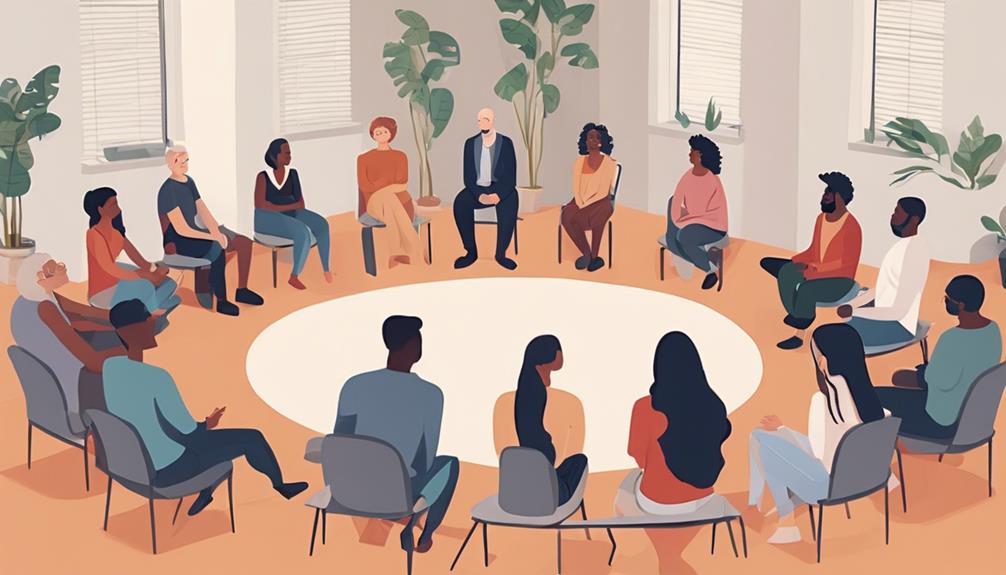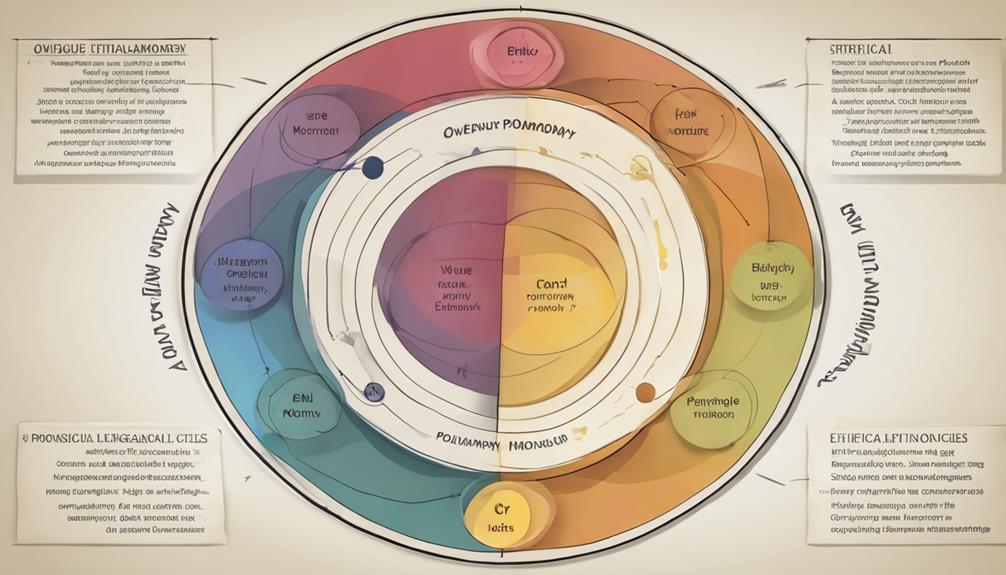In the complex world of ethical non-monogamy, therapists are crucial in helping individuals and couples navigate through the unfamiliar territory of different relationship styles.
The complexities of consensual non-monogamous dynamics often require a delicate balance of understanding and communication, shedding light on the intricate threads that weave through modern relationships.
However, the true essence of ethical non-monogamy lies not just in exploring these dynamics but in unraveling the layers of emotional introspection and growth that come with it.
Key Takeaways
- Prioritize clear communication to understand partners' needs and boundaries.
- Establish and regularly review rules and boundaries for emotional safety.
- Address jealousy through open dialogue and exploring root causes together.
- Seek therapy for guidance on communication, boundaries, and navigating complexities.
Understanding Ethical Non-Monogamy Dynamics
Navigating the intricate dynamics of ethical non-monogamy requires a deep understanding of each partner's needs and boundaries. As therapists specializing in diverse relationships, we recognize the complexities that come with ethical non-monogamy. Communication lies at the heart of these relationships, where honesty and transparency foster trust and respect. By setting clear boundaries and obtaining consent, partners can navigate this journey together while addressing emotional complexities such as jealousy or insecurity.
Support is key in these relationships, and as therapists, we aim to provide a safe space for individuals to explore their unique dynamics. We guide them in understanding societal norms and how they can challenge and reshape them within their relationships. Our role involves offering tools for healthy interactions, encouraging open communication, and fostering a deep sense of understanding between partners. Through our support, we help individuals in ethical non-monogamous relationships cultivate strong and fulfilling connections based on consent, respect, and mutual growth.
Differentiating Open Relationships and Polyamory

In ethical non-monogamous relationships, understanding the distinctions between open relationships and polyamory is essential for navigating the dynamics successfully. Open relationships primarily focus on consensual sexual relations without deep romantic connections, while polyamory involves engaging in multiple romantic relationships with emotional commitments.
In polyamorous relationships, there's a concept of having primary partners and extended family relationships, creating a more intricate network of connections. Polyamorous communities often embrace diverse gender and sexual orientations, fostering an environment of inclusivity and acceptance.
Partners in polyamorous relationships tend to report higher levels of relationship satisfaction, possibly due to the emphasis on open communication, clear boundaries, and managing expectations within the dynamic nature of these relationships. Embracing the nuances of these relationship styles requires strong communication skills, a deep understanding of individual boundaries and expectations, and a willingness to challenge societal stigma surrounding non-traditional romantic relationships.
Addressing Jealousy in Non-Monogamous Relationships
Addressing jealousy in non-monogamous relationships requires honest communication and a willingness to explore and understand personal insecurities. Jealousy, stemming from the fear of losing love or attention, can be a complex emotion to navigate in these dynamics. It's vital to engage in open dialogue with partners, sharing feelings and concerns without judgment. Therapists play a crucial role in helping individuals delve into the root causes of jealousy, offering coping mechanisms and emotional support along the way.
In non-monogamous relationships, practicing compersion – finding joy in your partner's happiness with others – can aid in managing jealousy. By acknowledging and addressing personal insecurities, individuals can work towards fostering a sense of security and trust within their relationships. Remember, jealousy is a natural emotion, but through ongoing communication and mutual understanding, it can be effectively addressed and even transformed into a catalyst for deeper connection and growth.
Establishing Rules and Boundaries Effectively

Effective establishment of rules and boundaries is paramount for fostering trust and respect within ethical non-monogamous relationships. In polyamorous dynamics, creating a solid foundation of guidelines ensures that all partners feel secure and valued. Here are some key strategies for establishing rules and boundaries effectively:
- Open Communication: Regular and honest discussions about boundaries are crucial to avoid misunderstandings and conflicts.
- Early Establishment: Setting rules early on provides a sense of security and predictability within the relationship structure.
- Guidelines for Behavior: Boundaries serve as essential guidelines for interactions with other partners, promoting emotional and physical safety.
- Regular Review: It's important to review and update boundaries periodically to accommodate changing feelings, needs, and relationship dynamics.
- Respect and Trust: Upholding each other's boundaries demonstrates respect and builds trust among partners, fostering a healthy and harmonious relationship.
Seeking Therapy for Non-Monogamous Relationships
Navigating ethical non-monogamous relationships can present unique challenges, and seeking therapy can provide valuable guidance and support in understanding and navigating these complexities. Therapy for non-monogamous relationships offers an open, supportive environment for individuals to explore the emotional and mental health aspects of their polyamorous dynamics. Specialized therapists, like Laurin Herrera, LMSW, are equipped to help individuals in multiple relationships address issues such as communication, jealousy, boundaries, and societal stigma. In therapy, individuals can delve into their sexual and emotional needs, as well as past experiences that may impact their current relationships. Through validation, education, and practical tools, therapy aids in effective communication and negotiation within non-monogamous dynamics, fostering healthier and more fulfilling connections. Below is a table highlighting some key aspects of seeking therapy for non-monogamous relationships:
| Aspects | Benefits | |
|---|---|---|
| Safe Space | Provides a secure environment for exploration | |
| Emotional Support | Offers understanding and validation | |
| Communication Tools | Equips individuals for effective negotiation |
Frequently Asked Questions
How Do You Navigate Ethical Non-Monogamy?
We navigate ethical non-monogamy by establishing clear communication and boundaries with all involved parties. Addressing feelings of jealousy and complex emotions through open discussions is crucial. Seeking support from therapists specializing in ethical non-monogamy can help navigate relationship dynamics effectively.
Regularly reviewing and adjusting relationship agreements is essential to accommodate evolving needs. Trust, respect, and consent are foundational values for maintaining healthy ethical non-monogamous relationships.
How Do You Know if Ethical Non-Monogamy Is Right for You?
If ethical non-monogamy is right for us hinges on deep self-reflection. We must assess our emotional capacity, communication skills, and comfort with societal norms.
Exploring our boundaries and willingness to grow is crucial. Seeking guidance from therapists and community resources can help us navigate this complex terrain.
Ultimately, understanding our desires, values, and ability to manage jealousy will guide us in determining if ethical non-monogamy aligns with our authentic selves.
How Do You Navigate an ENM Relationship?
Navigating an ENM relationship involves clear communication, establishing boundaries, and adapting agreements as needed. Trust and transparency are key to fostering healthy dynamics.
Prioritizing safe practices, open dialogue, and seeking support when necessary can enhance the journey. Embracing individual growth and addressing emotions openly helps navigate challenges.
What Do Therapists Think of Polyamory?
We believe therapists generally view polyamory as a valid relationship choice when based on open communication, trust, and respect. Understanding and validating polyamorous relationships is important to them. They stress the significance of clear boundaries, effective communication, and handling jealousy in such dynamics.
Therapy for polyamory focuses on fostering trust, managing complex emotions, and challenging societal norms surrounding monogamy. Therapists like Laurin Herrera, LMSW, provide specialized support for those in ethical non-monogamous relationships.
How Can Therapists Help Individuals Navigate Ethical Non-Monogamous Relationships?
Therapists can provide support and guidance for individuals navigating ethical nonmonogamy explained. By offering a safe space for open communication and addressing any challenges or concerns, therapists can help clients develop effective communication skills, establish healthy boundaries, and explore new ways to maintain trust and intimacy within their relationships.
Conclusion
As therapists specializing in ethical non-monogamy, we understand the complexities and challenges that come with navigating alternative relationship structures.
Did you know that a recent study found that 1 in 5 Americans have engaged in some form of consensual non-monogamy?
Remember, whether you're exploring open relationships or polyamory, seeking support and guidance from experienced therapists can help you cultivate healthy and fulfilling connections.
Embrace the journey with compassion and communication.









